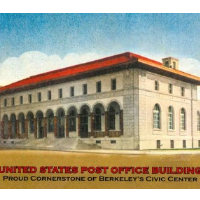Federal Report Calls for Delay in Sales of Historical Post Offices, but the Rest Are Still Fair Game

Berkeley residents were buoyed last week by a federal report (pdf) that calls for delaying the closure and sale of historic post offices like theirs until their historic value has been properly assessed and taken into account.
The Advisory Council on Historic Preservation (ACHP) released a study it did at the request of Congress in January to determine if the government's headlong rush to privatize the U.S. Postal Service (USPS) and sell off its assets to the highest bidder illegally impacted a few historic buildings around the country. Its answer was “yes.”
Preservationists and city officials in Berkeley were aghast when first told that the 1914 Second Renaissance Revival-style post office was toast and a month-long protest outside the building in 2012 got the public's attention. It was one of three California post offices on a current list of 15 for sale, including a 1941 “Spanish Eclectic and Spanish Colonial Revival” building in Burlingame and a 1932 building in Palo Alto.
A statement from the Postal Service cited by the Los Angeles Times says that 1,900 of the agency's 9,000 properties could be considered for the National Register of Historic Places.
Fourteen historic buildings have already been sold, according to the report, including one in Santa Monica and another in Venice. The 1939 Venice Art Deco building, with its iconic interior “Story of Venice” mural, was sold to Silver Pictures Entertainment million in 2012.
The report, which is only advisory, argued that the government has failed to comply with Section 106 of the National Historic Preservation Act, which all agencies of the federal government are required to follow. It cited a failure to evaluate the buildings for their historic value, assess community impact, conduct public hearings, issue public notices, be transparent in its proceedings and act in a timely fashion.
Frances Dinkelspiel, a reporter for Berkeleyside, wrote that the federal government's lack of transparency and cooperation with the community was evident in its unwillingness to identify the city as an interested stakeholder in the process of disposal. Antonio Rossmann, an attorney hired by Berkeley to help fight the sale, told her the city has not seen documents that are always made available to prospective buyers, including information it requested on the condition of the structure.
The report's introduction begins with a statement that its authors seem to consider self-evident but has held little sway of late. “Few would deny that the local post office is a key component of the civic heart of communities across the nation. These structures have served for decades as centers of commerce and communication as well as valued community meeting places.”
In contrast, it is conventional wisdom that the Internet, competition from the innovative private sector and sky-high pension costs of pampered federal employees are killing the Postal Service. Critics say the only hope is to slash costs, scale back services, sell off unnecessary assets and shift the business of mail delivery to more efficient private owners.
Critics of the critics dispute most every allegation made. The post office, they say, is being savaged for thinly-disguised political reasons, including the destruction of the largest organized labor force in the country, postal workers (40% of whom are minorities). The Number One contributor to the Postal Service’s annual net operating loss, which currently runs in the billions of dollars, is a law passed by the Republican-controlled Congress in 2006.
The law forced the USPS to prefund its future health care benefit payments to retirees for the next 75 years. The Postal Service was ordered to pay for the benefits of workers it hasn’t even hired and do it in an accelerated time frame, a requirement not demanded of any other federal government agency.
The law instantly put the post office on the verge of bankruptcy and unleashed a movement to villainize and privatize the service. Unions would take a beating, private carriers would get a boost and $85 billion in hard assets could be sold to those who would know how to properly monetize them.
The Postal Service has been selling and leasing buildings through an exclusive contract with CBRE Group Inc., a real estate giant that has been criticized by the USPS Office of Inspector General. The inspector general is expected to soon issue a full report on the postal service sales.
Even if Congress accepts the recommendations of the advisory group and actually preserves what's left of the historic buildings, the Postal Service will be in shambles. And yet another opportunity to fix a critical public function will give way to privatization and getting about the business of business.
–Ken Broder
To Learn More:
Federal Report Calls to Stop Sale of Berkeley Post Office (by Frances Dinkelspiel, Berkeleyside)
Historic Preservation Agency Seeks Halt in Post Office Sales (by Lee Romney, Los Angeles Times)
Preserving Historic Post Offices: A Report to Congress (Advisory Council on Historic Preservation) (pdf)
Legislation Offers Hope that Historical Berkeley Post Office Won’t be Part of Nationwide Selloff (by Ken Broder, AllGov California)
- Top Stories
- Controversies
- Where is the Money Going?
- California and the Nation
- Appointments and Resignations
- Unusual News
- Latest News
- California Forbids U.S. Immigration Agents from Pretending to be Police
- California Lawmakers Urged to Strip “Self-Dealing” Tax Board of Its Duties
- Big Oil’s Grip on California
- Santa Cruz Police See Homeland Security Betrayal in Use of Gang Roundup as Cover for Immigration Raid
- Oil Companies Face Deadline to Stop Polluting California Groundwater





